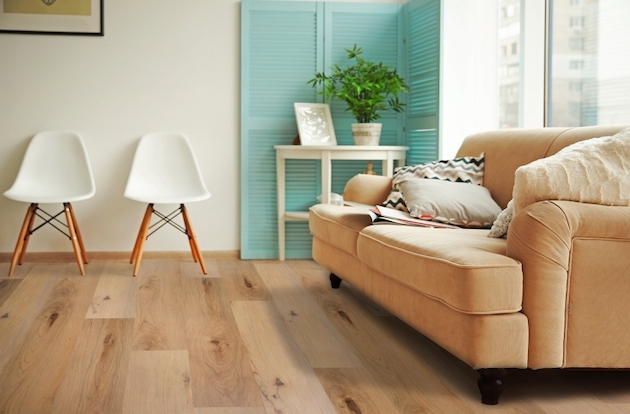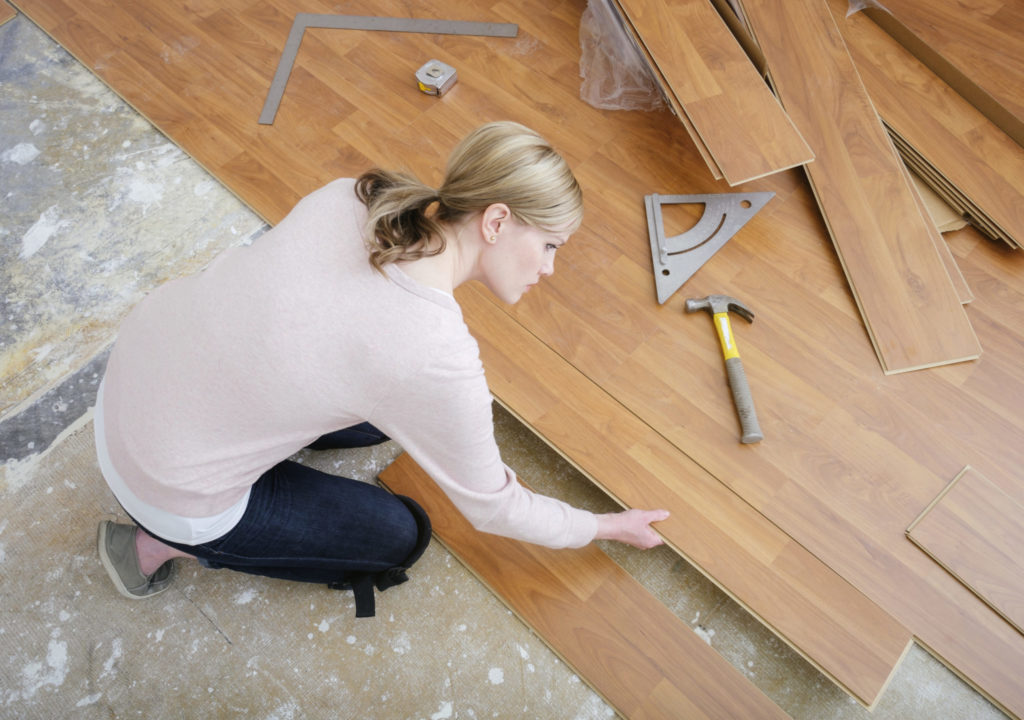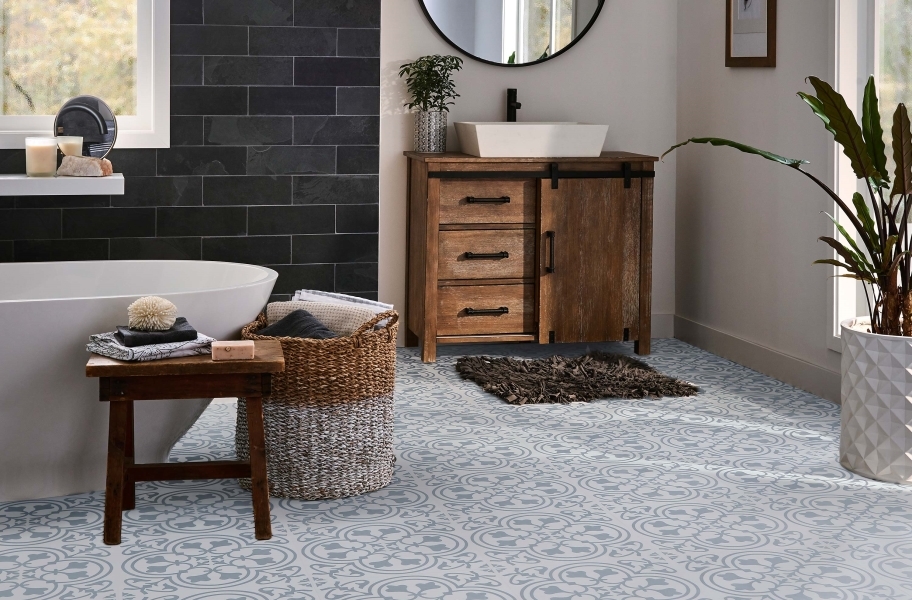For years, vinyl flooring has been one of the fastest-growing categories of flooring. People love it because there are so many options to choose from, and it can come in virtually any style. But do you really know the facts about this flooring? There are a lot of vinyl flooring myths out there, and that can lead to confusion when shopping.
Don’t worry, though! When it comes to vinyl flooring, we know our stuff. So, without further ado, let’s debunk six of the most common myths about vinyl flooring!
Related Content >Vinyl Flooring FAQ: 20+ Things You Should Know
Myth 1: Vinyl Flooring is Toxic

Expert Opinion: Mostly False
We get asked this a lot: “Is vinyl flooring toxic?” In the past, when manufacturing standards weren’t as high, the answer could often be yes. Vinyl flooring from years ago could have high contents of lead, cadmium, and VOCs. Since vinyl is a petroleum-based product made from polyvinyl chloride (PVC), it can potentially off-gas VOCs.
But these days, it’s much easier to find safe, non-toxic vinyl flooring.
The EPA has set standards for products that meet the Indoor Air Quality (IAQ) Certification standard. Many manufacturers now submit their flooring to the Resilient Floor Covering Institute (RFCI) for safety certification. RFCI is an independent, privately held label that created FloorScore with Scientific Certification Systems (SCS) to ensure unbiased testing and auditing.
Pro Tip: If you want to ensure that your floor is safe for the whole family, look for vinyl flooring that is made in the USA or is FloorScore Certified. We recommend TritonCore Pro 7″ Rigid Core Vinyl Planks
Related Content >What Are VOCs in Floors? A Guide to Non-Toxic Flooring
Myth 2: All Vinyl Flooring Is the Same

Expert Opinion: False
There are so many kinds of vinyl flooring: waterproof, peel and stick, sheet vinyl, and then all those acronyms: SPC, WPC, LVF. It can start to look like a jumble of alphabet soup. Let’s start with the basics so you know more about your options.
WPC vinylWPC vinyl flooring is 100% waterproof, and it features a wood-plastic composite core. WPC is recommended for residential use since it is softer underfoot.SPC vinylAlso, referred to as Rigid Core luxury vinyl flooring, SPC features an ultra-dense, 100% waterproof stone-plastic composite core. SPC is great for both residential and commercial use.LVF vinyl: This is the acronym for luxury vinyl flooring. Luxury vinyl flooring is the umbrella term that encompasses WPC and SPC. LVF can also refer to vinyl that is not waterproof but has quality visuals, and usually a glue-down or a locking installation.
Pro Tip: Vinyl flooring also comes in three main forms: plankstiles, and sheets/rolls. Vinyl plank flooring is perfect for wood-look styles. If you want a stone-look floor, vinyl tile flooring is the best option. Sheet vinyl flooring offers the widest selection of decorative looks.
Related Content >Vinyl Flooring Buying Guide
Myth 3: Vinyl Flooring and Laminate are the Same
Expert Opinion: False
Laminate flooring and vinyl flooring may look the same at first glance, but there are important differences. They’re made from different materials, they don’t handle water the same way, and they have different price points. Compare laminate vs. vinyl flooring to get a better idea of the distinctions.
Laminate:
Fiberboard wood coreNot as waterproof as vinylScratch-resistant wear layerHollow sound if installed improperly
Luxury Vinyl Flooring:
PVC, WPC, or SPC coreNot as scratch-resistant as laminateMore waterproof than laminateCan be more expensive than laminate
Pro Tip: Want to know more about what makes these two flooring options unique? Our Laminate vs. Vinyl Flooring guide offers a more in-depth comparison of installation, cost, eco-friendliness, and more.
Related Content > How to Install Vinyl Flooring on Stairs
Myth 4: Vinyl Rolls and Linoleum are the Same
Expert Opinion: False
Vinyl rolls and linoleum flooring are very different! At one time the only vinyl anybody knew about was sheet vinyl, which has a rolled appearance similar to linoleum. Because of this, a lot of people confuse the two. Check out this linoleum vs. vinyl comparison to get the facts.
Linoleum:
Made of natural materialsAnti-microbialAnti-static propertiesNeeds to be sealed every yearRequires a professional installation
Luxury Vinyl Rolls:
Made of durable PVCProtective wear layerBacking options for fiberglass, foam, or feltDIY-friendly installationVirtually no maintenance
Pro Tip: Typically vinyl is less expensive than linoleum upfront. But it’s important to remember that linoleum can last sometimes twice as long as vinyl, depending on the type, manufacturer, and the traffic it receives. That being said, linoleum does tend to wear over time, especially when it’s not properly cared for.
Related Content >Linoleum vs. Vinyl Flooring
Myth 5: Vinyl Flooring is Hard to Install

Expert Opinion: False
Vinyl flooring installation is actually quite easy! There are a few options for installation that you should know about.
Tongue and groove installation Tongue and groove a.k.a. click lock vinyl is one of the simplest ways to install vinyl flooring. This type of installation requires no tape or adhesive and creates a floating floor.Peel and stick installationIt doesn’t get easier than this! Slowly peel back the paper to reveal the adhesive. Then firmly place the tile or plank by pressing it down onto the surface.Sheet vinyl installationYou can loose lay most vinyl sheets these days, which just means you roll them out and cut them to fit. For a more secure install, you can also spread glue over the subfloor before carefully rolling out the sheet vinyl.
Pro Tip: For more help with DIY-friendly vinyl flooring installation, check out our guide on how to install vinyl flooring in three different ways.
Myth 6: Vinyl Flooring is Outdated

Expert Opinion: False
Decades ago, vinyl flooring had a reputation for being flimsy or outdated. But since then, new manufacturing technology has revolutionized the vinyl flooring industry.
Advancing technology has given vinyl manufacturers the ability to create realistic tiles and planks mimicking natural looks, such as wood and stone They are also creating unique, decorative looks that used to only be available with flooring like tile.
The stylish new looks aren’t the only way vinyl flooring has been modernized. You can now also enjoy 100% waterproof vinyl with WPC or SPC cores that will protect your floor from water damage. Waterproof vinyl flooring is so popular these days that other flooring categories have started following this trend too!
Pro Tip: To find vinyl flooring options that perfectly match your style, get inspired with our in-depth guide to Vinyl Flooring Trends
Conclusion
Now that we’ve busted these myths, you know the facts about vinyl flooring, and you can shop with confidence.
Want to learn more about vinyl flooring?Check out our FAQ, or order some free samples to experience it yourself!
Order Free Samples Shop All Vinyl Flooring
The post 6 Vinyl Flooring Myths: Get the Facts from Our Experts appeared first on Flooring Inc.